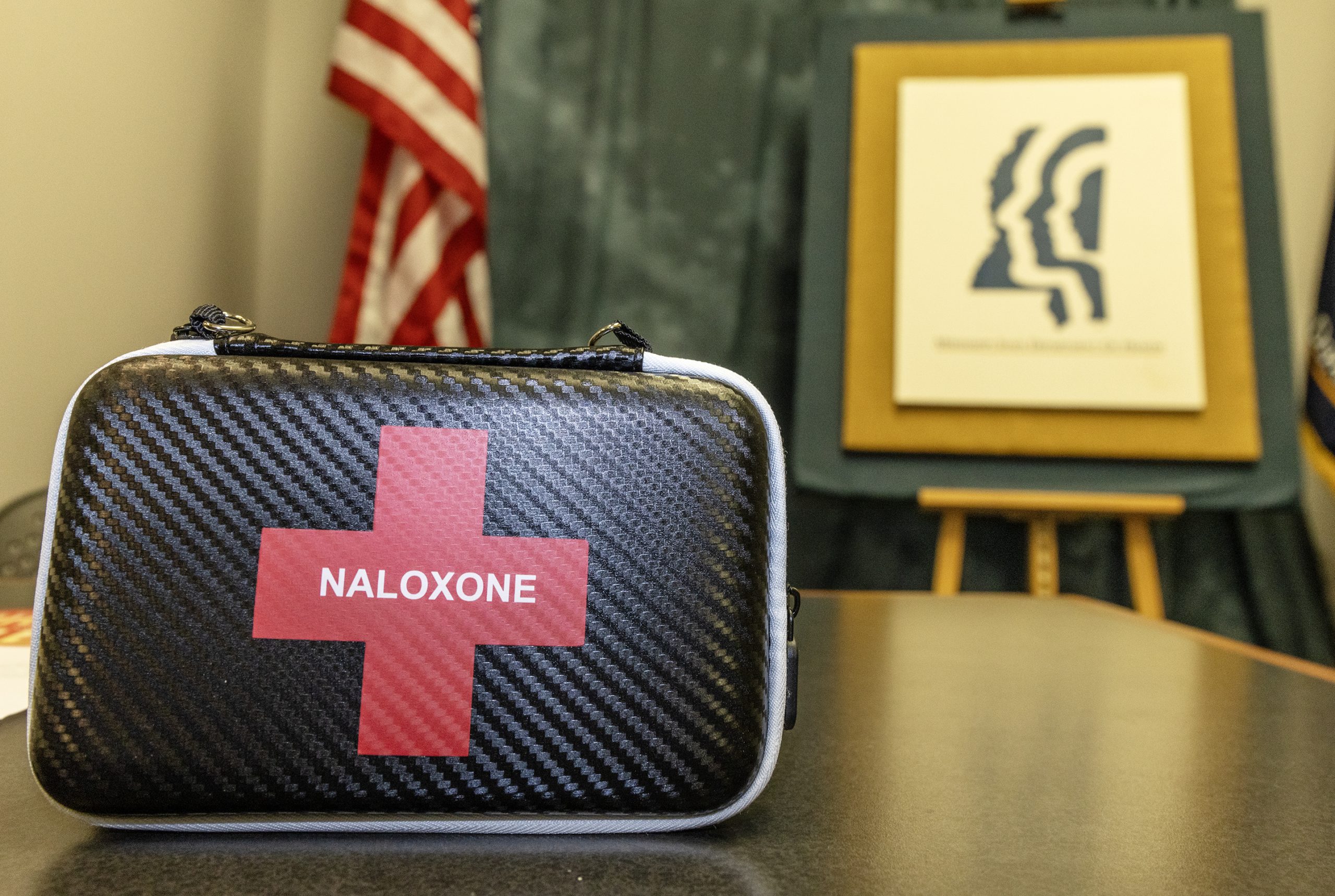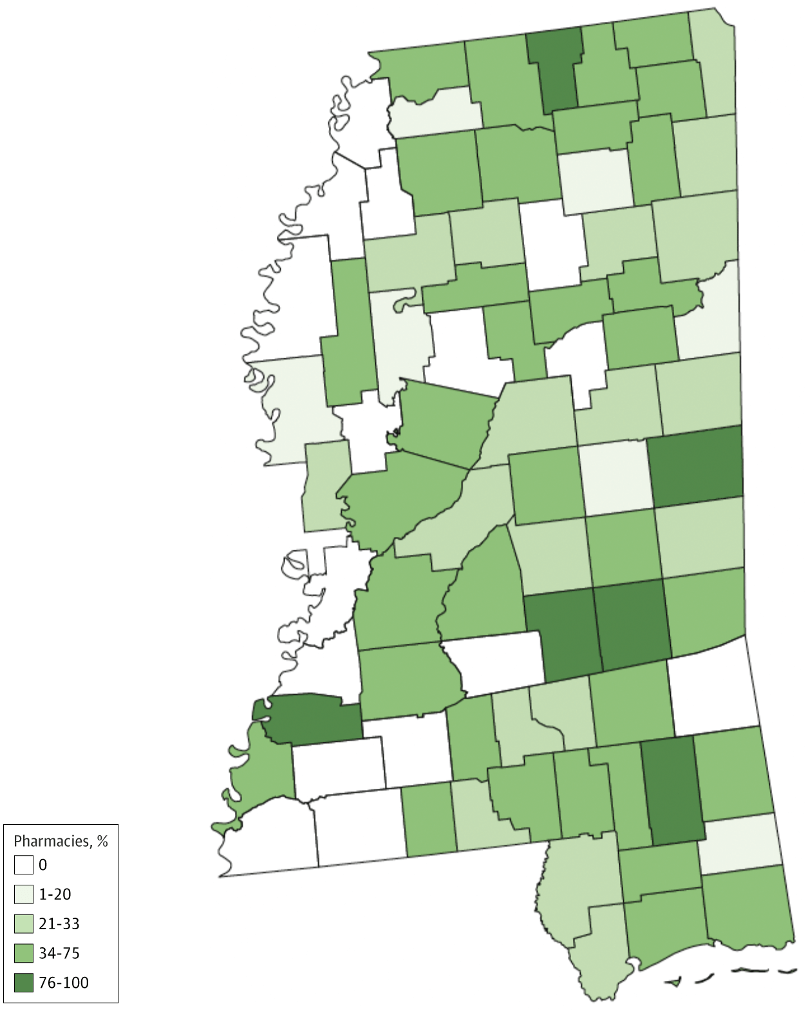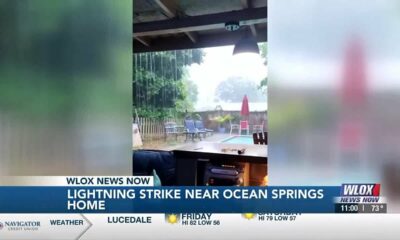Mississippi Today
Mississippi pharmacies fall short in providing opioid-reversal drug, study shows

Almost half of Mississippi pharmacists are not readily storing and selling naloxone, according to a study conducted by researchers at the University of Mississippi.
More than 40% of Mississippi pharmacies do not carry naloxone, despite a 2017 standing order from the state that allows pharmacists to dispense naloxone with or without a prescription at a patient's request.
This is the first study since the passage of the order to investigate the accessibility of naloxone, commonly known as Narcan – a drug that can reverse the effects of an opioid overdose.

Emily Gravlee, a fourth-year University of Mississippi doctoral student in pharmacy administration and creator of the study for her master's thesis, said it's important to have naloxone available at community pharmacies because they are access points for many people.
“If we don't have naloxone available at community pharmacies, then that could potentially represent a missed opportunity for a patient to receive a life-saving medication,” Gravlee told Mississippi Today.
Using a secret shopper method, volunteers cold-called 591 community pharmacies to request the drug: 328 were independent pharmacies, 147 were chain pharmacies and 116 were grocery store pharmacies.
The report showed that only 25% of independent pharmacies had naloxone available for same-day pickup, resulting in the lowest proportion out of the three groups. Fifty-six percent of grocery store pharmacies offered naloxone.
Mona Arnold-McBride, executive director of the Mississippi Pharmacists Association, did not make herself available for an interview with Mississippi Today for the story.
Sujith Ramachandran, associate professor of the Department of Pharmacy Administration at the University of Mississippi and one of the paper's coauthors, said there could be multiple reasons that independent pharmacies fall short among community pharmacies.
Standardized corporate policies may be in place throughout chain pharmacies to stock and dispense naloxone, while independent pharmacies' policies vary from business to business.
“I personally know some independent pharmacies that took an initiative to make sure they stock naloxone and are engaging in harm reduction services where possible, but that sort of proactiveness is not consistent across all independent pharmacies,” Ramachandran told Mississippi Today.
Robert Hugh Dozier, executive director of Mississippi Independent Pharmacies Association (MIPA), said the association sees naloxone availability as a positive because it can keep people safe, but ultimately, independent pharmacies will each decide whether or not to stock naloxone.
“If the product is priced too high, and the pharmacy cost is high, they might not be able to stock that product in their pharmacy,” Dozier told Mississippi Today. “There also may not be a market need for it in their surrounding area.”
According to the Mississippi Opioid and Heroin Data Collaborative, 78% of overdosing deaths in the state were caused by opioids in 2022, compared to 72% in 2021.
The University of Mississippi study noted how naloxone was least available in the western part of the state.
Credit: Naloxone Accessibility Under the State Standing Order Across Mississippi. JAMA Netw Open. July 6, 2023. Page 6. Copyright © 2023. American Medical Association. All rights reserved.
Gravlee said broadly speaking, educational interventions about the accessibility of naloxone could be a useful approach for both pharmacies and people.
“Maybe, more than we realize, it's a two-piece problem,” Gravlee said. “Pharmacies may not know about the standing order or understand the standing order, but also patients, people, in the community may not know that they can receive this drug under the standing order.”
Under the Health's Opioid and Substance Use Disorder Program through the Mississippi State Department of Health, Mississippians can receive free naloxone kits, which cost about $100 without insurance coverage.
The naloxone kits include two doses of naloxone, an index card on how to recognize an overdose, the signs and symptoms a person may experience and how to administer naloxone.
For every person who requests naloxone, a pharmacist transcribes the prescription, and the order is then labeled and shipped to the individual's mailing address.
There have been roughly 7,000 kits shipped directly to individuals as of early September, according to the state Department of Health.
This article first appeared on Mississippi Today and is republished here under a Creative Commons license.
Mississippi Today
On this day in 1968
MAY 11, 1968

The Poor People's Campaign arrived in Washington, D.C. A town called “Resurrection City” was erected as a tribute to the slain Martin Luther King Jr.
King had conceived the campaign, which was led by his successor at the head of the Southern Christian Leadership Conference, Ralph David Abernathy. Civil rights leader Jesse Jackson reached out to young Black men wanting vengeance for King's assassination.
“Jackson sat them down and said, ‘This is just not the way, brothers. It's just not the way,”' recalled Lenneal Henderson, then a student at the University of California at Berkeley. “He went further and said, ‘Look, you've got to pledge to me and to yourself that when you go back to wherever you live, before the year is out, you're going to do two things to make a difference in your neighborhood.' It was an impressive moment of leadership.”
This article first appeared on Mississippi Today and is republished here under a Creative Commons license.
Mississippi Today
Lawmakers may have to return to Capitol May 14 to override Gov. Tate Reeves’ potential vetoes
Legislators might not have much notice on whether they will be called back to the Mississippi Capitol for one final day of the 2024 session.
Speaker Jason White, who presides over the House, and Lt. Gov. Delbert Hosemann, who presides over the Senate, must decide in the coming days whether to reconvene the Legislature for one final day in the 2024 session on Tuesday at 1 p.m.
Lawmakers left Jackson on May 4. But under the joint resolution passed during the final days of the session, legislators gave themselves the option to return on May 14 unless Hosemann and White “jointly determine that it is not necessary to reconvene.”
The reason for the possible return on Tuesday presumably is to give the Legislature the opportunity to take up and try to override any veto by Gov. Tate Reeves. The only problem is the final bills passed by the Legislature — more than 30 — are not due action by Reeves until Monday, May 13. And technically the governor has until midnight Monday to veto or sign the bills into law or allow them to become law without his signature.
Spokespeople for both Hosemann and White say the governor has committed to taking action on that final batch of bills by Monday at 5 p.m.
“The governor's office has assured us that we will receive final word on all bills by Monday at 5 p.m.,” a spokesperson for Hosemann said. “In the meantime, we are reminding senators of the possibility of return on Tuesday.”
A spokesperson for White said, “Both the House and Senate expect to have all bills returned from the governor before 5 p.m. on Monday. The lieutenant governor and speaker will then decide if there is a reason to come back on May 14.”
The governor has five days to act on bills after he receives them while legislators are in session, which technically they still are. The final batch of bills were ready for the governor's office one day before they were picked up by Reeves staff. If they had been picked up that day earlier, Reeves would have had to act on them by Saturday.
At times, the governor has avoided picking up the bills. For instance, reporters witnessed the legislative staff attempt to deliver a batch of bills to the governor's Capitol office one day last week, but Reeves' staff refused to accept the bills. They were picked up one day later by the governor's staff, though.
Among the bills due Monday is the massive bill that funds various projects throughout the state, such as tourism projects and infrastructure projects. In total, there are more than 325 such projects totaling more than $225 million in the bill.
In the past, the governor has vetoed some of those projects.
The governor already has taken action of multiple bills passed during the final days of the session.
He allowed a bill to strip some of the power of the Public Employees Retirement System Board to become law without his signature. The bill also committed to providing a 2-and-one-half percent increase in the amount governmental entities contribute to the public employee pension plan over a five year period.
A bill expanding the area within the Capitol Complex Improvement District, located in the city of Jackson, also became law without his signature. The CCID receives additional funding from the state for infrastructure projects. A state Capitol Police Force has primary law enforcement jurisdiction in the area.
The governor signed into law earlier this week legislation replacing the long-standing Mississippi Adequate Education Program, which has been the mechanism to send state funds to local schools for their basis operation.
This article first appeared on Mississippi Today and is republished here under a Creative Commons license.
Mississippi Today
On this day in 2007


MAY 10, 2007

An Alabama grand jury indicted former state trooper James Bonard Fowler for the Feb. 18, 1965, killing of Jimmie Lee Jackson, who was trying to protect his mother from being beaten at Mack's Café.
At Jackson's funeral, Martin Luther King Jr. called him “a martyred hero of a holy crusade for freedom and human dignity.” As a society, he said, “we must be concerned not merely about who murdered him, but about the system, the way of life, the philosophy which produced the murderer.”
Authorities reopened the case after journalist John Fleming of the Anniston Star published an interview with Fowler in which he admitted, despite his claim of self-defense, that he had shot Jackson multiple times. And Fleming uncovered Fowler's killing of another Black man, Nathan Johnson. In 2010, Fowler pleaded guilty to second-degree manslaughter and was sentenced to six months behind bars.
This article first appeared on Mississippi Today and is republished here under a Creative Commons license.
-
SuperTalk FM5 days ago
Legislation outlawing ‘squatted’ vehicles in Mississippi signed into law
-
SuperTalk FM3 days ago
Mississippi governor approves bill allowing electronic search warrants
-
228Sports4 days ago
PRC’s Bats Come Alive Late As Blue Devils Beat Picayune To Advance To 6A South State Title Series
-
Mississippi Today6 days ago
On this day in 1917
-
Mississippi News6 days ago
LCSO wants people aware of a scam circling the area
-
Mississippi News6 days ago
Winston Co. Sheriff’s Office investigates shooting at Dave’s Club
-
Mississippi News4 days ago
Strong storms late Wednesday night – Home – WCBI TV
-
Mississippi News3 days ago
Crews close Jackson street due to large sinkhole





![HIGH SCHOOL SOFTBALL: Hancock @ George County (5/9/2024) [6A Playoffs, South State]](https://www.biloxinewsevents.com/wp-content/uploads/2024/05/1715458516_maxresdefault-400x240.jpg)
![HIGH SCHOOL SOFTBALL: Hancock @ George County (5/9/2024) [6A Playoffs, South State]](https://www.biloxinewsevents.com/wp-content/uploads/2024/05/1715458516_maxresdefault-80x80.jpg)
![HIGH SCHOOL SOFTBALL: Vancleave @ East Central (5/9/2024) [5A Playoffs, South State]](https://www.biloxinewsevents.com/wp-content/uploads/2024/05/1715460379_maxresdefault-400x240.jpg)
![HIGH SCHOOL SOFTBALL: Vancleave @ East Central (5/9/2024) [5A Playoffs, South State]](https://www.biloxinewsevents.com/wp-content/uploads/2024/05/1715460379_maxresdefault-80x80.jpg)




![HIGH SCHOOL SOFTBALL: East Central @ Vancleave (5/10/2024) [5A Playoffs, South State]](https://www.biloxinewsevents.com/wp-content/uploads/2024/05/1715456655_maxresdefault-400x240.jpg)
![HIGH SCHOOL SOFTBALL: East Central @ Vancleave (5/10/2024) [5A Playoffs, South State]](https://www.biloxinewsevents.com/wp-content/uploads/2024/05/1715456655_maxresdefault-80x80.jpg)
![HIGH SCHOOL SOFTBALL: Wesson @ St. Patrick (5/10/2024) [3A Playoffs, South State]](https://www.biloxinewsevents.com/wp-content/uploads/2024/05/1715462236_maxresdefault-400x240.jpg)
![HIGH SCHOOL SOFTBALL: Wesson @ St. Patrick (5/10/2024) [3A Playoffs, South State]](https://www.biloxinewsevents.com/wp-content/uploads/2024/05/1715462236_maxresdefault-80x80.jpg)




















